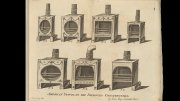1915 A group of 800 Harvard-educated farmers claim the right to call their organization the "Harvard Farmers Association." A letter to the Bulletin's editor doubts that "such a proposed association of farmers would be likely to besmirch the fair name of their college."
1920 "Graduates' Day" attracts 160 alumni to learn about "progress in the University," including new admission requirements, new freshman dorms, and the new requirement for compulsory physical education.
1925 The Associated Harvard Clubs' Committee on Service to the University suggests that descendants of Harvard graduates be given preference in the admission process; the editors of the Bulletin write, "Inbreeding within the student body would be quite as dangerous for the College itself as inbreeding in the Faculty would be. The latter kind of limitation has not been observed at Harvard in our memory; the former kind never should be established."
1930 The Harvard Botanic Garden is shifted to "scientific, rather than horticultural purposes"; "cultivation of decorative plants [is] reduced to a minimum."
1940 A poll of seniors for the 1940 class album reports that 52 percent anticipate a life "characterized by possible social and cultural turmoil, crisis, and catastrophe"; 56 percent feel the New Deal "should be either halted and abandoned or curtailed and modified"; and 18 percent believed Western culture is declining--though one man writes, "I don't know--will have to wait until the next Marx Bros. picture comes out."
1950 Even though the 50-year-old shout "Oh, Rinehart!"--Harvard's traditional rallying cry--has become "nearly extinct...On April 28...[it] rang out again across the Yard. It was late in the evening and lasted less than 10 minutes, but the cry was unmistakable. With proper care," the editors write, "'Oh, Rinehart!' may yet usher out the century in the beginnings of which it was first heard."
1955 Seniors are relieved when Civil Defense officials declare the University area exempt from a nationwide hydrogen bomb test-alert scheduled for the morning of Commencement. "The news brought welcome reassurance that H still stands first for Harvard, second for Hydrogen."
1965 After finding news from a Radcliffe graduate in the class of '63 notes, an irate alumnus writes, "If Radcliffe alumnae...must indeed appear in the Bulletin, why can't they be given a separate section...?" and suggests that Harvard men begin to send notes to the Radcli!=e Quarterly in retaliation. [Harvard degrees were first granted to Radcliffe seniors in 1963, making them alumnae of Harvard College as well as Harvard University.]
1975 Class Day speaker Dick Gregory tells seniors, "You must offer your services to save the needy from the greedy....Universities have to teach how to live, and get out of the business of teaching how to make a living."





